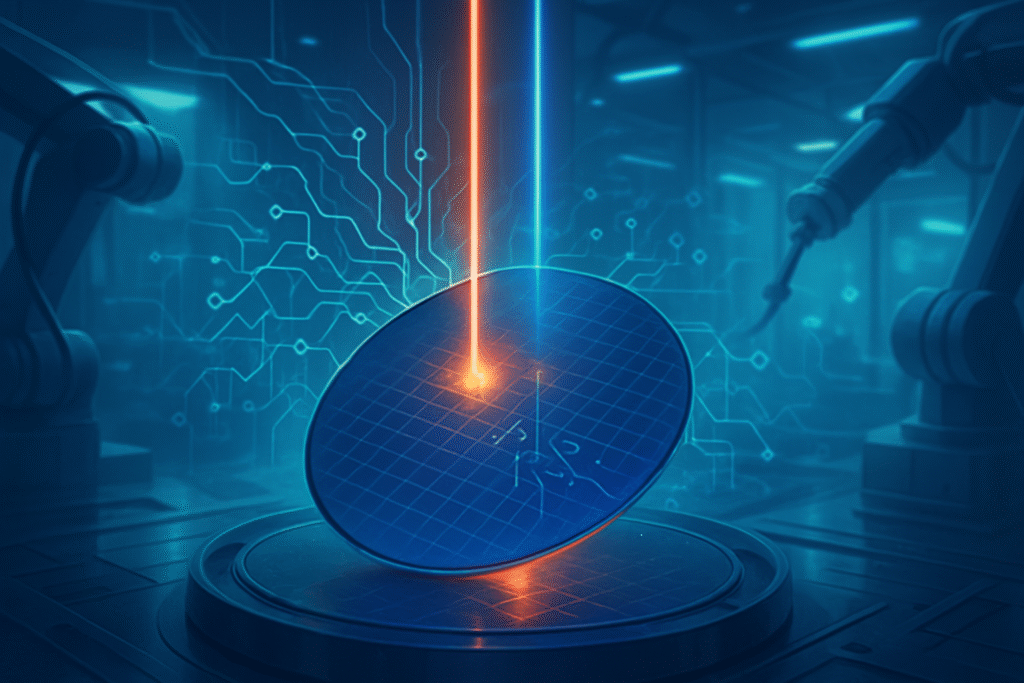
October 7, 2025 – In a significant leap forward for semiconductor manufacturing, Advanced Energy Industries, Inc. (NASDAQ: AEIS) today announced the launch of its revolutionary 401M Mid-Infrared Pyrometer. Debuting at SEMICON® West 2025, this cutting-edge optical pyrometer promises to redefine precision temperature control in the intricate processes essential for producing the next generation of advanced AI chips. With AI’s insatiable demand for more powerful and efficient hardware, the 401M arrives at a critical juncture, offering unprecedented accuracy and speed that could dramatically enhance yields and accelerate the development of sophisticated AI processors.
The 401M Mid-Infrared Pyrometer is poised to become an indispensable tool in the fabrication of high-performance semiconductors, particularly those powering the rapidly expanding artificial intelligence ecosystem. Its ability to deliver real-time, non-contact temperature measurements with exceptional precision and speed directly addresses some of the most pressing challenges in advanced chip manufacturing. As the industry pushes the boundaries of Moore's Law, the reliability and consistency of processes like epitaxy and chemical vapor deposition (CVD) are paramount, and Advanced Energy's latest innovation stands ready to deliver the meticulous control required for the complex architectures of future AI hardware.
Unpacking the Technological Marvel: Precision Redefined for AI Silicon
The Advanced Energy 401M Mid-Infrared Pyrometer represents a substantial technical advancement in process control instrumentation. At its core, the device offers an impressive accuracy of ±3°C across a wide temperature range of 50°C to 1,300°C, coupled with a lightning-fast response time as low as 1 microsecond. This combination of precision and speed is critical for real-time closed-loop control in highly dynamic semiconductor manufacturing environments.
What truly sets the 401M apart is its reliance on mid-infrared (1.7 µm to 5.2 µm spectral range) technology. Unlike traditional near-infrared pyrometers, the mid-infrared range allows for more accurate and stable measurements through transparent surfaces and outside the immediate process environment, circumventing interferences that often plague conventional methods. This makes it exceptionally well-suited for demanding applications such as lamp-heated epitaxy, CVD, and thin-film glass coating processes, which are foundational to creating the intricate layers of modern AI chips. Furthermore, the 401M boasts integrated EtherCAT® communication, simplifying tool integration by eliminating the need for external modules and enhancing system reliability. It also supports USB, Serial, and analog data interfaces for broad compatibility.
This innovative approach significantly differs from previous generations of pyrometers, which often struggled with the complexities of measuring temperatures through evolving film layers or in the presence of challenging optical interferences. By providing customizable measurement wavelengths, temperature ranges, and working distances, along with automatic ambient thermal correction, the 401M offers unparalleled flexibility. While initial reactions from the AI research community and industry experts are just beginning to surface given today's announcement, the consensus is likely to highlight the pyrometer's potential to unlock new levels of process stability and yield, particularly for sub-7nm process nodes crucial for advanced AI accelerators. The ability to maintain such tight thermal control is a game-changer for fabricating high-density, multi-layer AI processors.
Reshaping the AI Chip Landscape: Strategic Advantages and Market Implications
The introduction of Advanced Energy's 401M Mid-Infrared Pyrometer carries profound implications for AI companies, tech giants, and startups operating in the semiconductor space. Companies at the forefront of AI chip design and manufacturing, such as NVIDIA (NASDAQ: NVDA), Intel (NASDAQ: INTC), Taiwan Semiconductor Manufacturing Company (TSMC) (NYSE: TSM), and Samsung Electronics (KRX: 005930), stand to benefit immensely. These industry leaders are constantly striving for higher yields, improved performance, and reduced manufacturing costs in their pursuit of ever more powerful AI accelerators. The 401M's enhanced precision in critical processes like epitaxy and CVD directly translates into better quality wafers and a higher number of functional chips per wafer, providing a significant competitive advantage.
For major AI labs and tech companies that rely on custom or leading-edge AI silicon, this development means potentially faster access to more reliable and higher-performing chips. The improved process control offered by the 401M could accelerate the iteration cycles for new chip designs, enabling quicker deployment of advanced AI models and applications. This could disrupt existing products or services by making advanced AI hardware more accessible and cost-effective to produce, potentially lowering the barrier to entry for certain AI applications that previously required prohibitively expensive custom silicon.
In terms of market positioning and strategic advantages, companies that adopt the 401M early could gain a significant edge in the race to produce the most advanced and efficient AI hardware. For example, a foundry like TSMC, which manufactures chips for a vast array of AI companies, could leverage this technology to further solidify its leadership in advanced node production. Similarly, integrated device manufacturers (IDMs) like Intel, which designs and fabricates its own AI processors, could see substantial improvements in their manufacturing efficiency and product quality. The ability to consistently produce high-quality AI chips at scale is a critical differentiator in a market experiencing explosive growth and intense competition.
Broader AI Significance: Pushing the Boundaries of What's Possible
The launch of the Advanced Energy 401M Mid-Infrared Pyrometer fits squarely into the broader AI landscape as a foundational enabler for future innovation. As AI models grow exponentially in size and complexity, the demand for specialized hardware capable of handling massive computational loads continues to surge. This pyrometer is not merely an incremental improvement; it represents a critical piece of the puzzle in scaling AI capabilities by ensuring the manufacturing quality of the underlying silicon. It addresses the fundamental need for precision at the atomic level, which is becoming increasingly vital as chip features shrink to just a few nanometers.
The impacts are wide-ranging. From accelerating research into novel AI architectures to making existing AI solutions more powerful and energy-efficient, the ability to produce higher-quality, more reliable AI chips is transformative. It allows for denser transistor packing, improved power delivery, and enhanced signal integrity – all crucial for AI accelerators. Potential concerns, however, might include the initial cost of integrating such advanced technology into existing fabrication lines and the learning curve associated with optimizing its use. Nevertheless, the long-term benefits in terms of yield improvement and performance gains are expected to far outweigh these initial hurdles.
Comparing this to previous AI milestones, the 401M might not be a direct AI algorithm breakthrough, but it is an essential infrastructural breakthrough. It parallels advancements in lithography or material science that, while not directly AI, are absolutely critical for AI's progression. Just as better compilers enabled more complex software, better manufacturing tools enable more complex hardware. This development is akin to optimizing the very bedrock upon which all future AI innovations will be built, ensuring that the physical limitations of silicon do not impede the relentless march of AI progress.
The Road Ahead: Anticipating Future Developments and Applications
Looking ahead, the Advanced Energy 401M Mid-Infrared Pyrometer is expected to drive both near-term and long-term developments in semiconductor manufacturing and, by extension, the AI industry. In the near term, we can anticipate rapid adoption by leading-edge foundries and IDMs as they integrate the 401M into their existing and upcoming fabrication lines. This will likely lead to incremental but significant improvements in the yield and performance of current-generation AI chips, particularly those manufactured at 5nm and 3nm nodes. The immediate focus will be on optimizing its use in critical deposition and epitaxy processes to maximize its impact on chip quality and throughput.
In the long term, the capabilities offered by the 401M could pave the way for even more ambitious advancements. Its precision and ability to measure through challenging environments could facilitate the development of novel materials and 3D stacking technologies for AI chips, where thermal management and inter-layer connection quality are paramount. Potential applications include enabling the mass production of neuromorphic chips, in-memory computing architectures, and other exotic AI hardware designs that require unprecedented levels of manufacturing control. Challenges that need to be addressed include further miniaturization of the pyrometer for integration into increasingly complex process tools, as well as developing advanced AI-driven feedback loops that can fully leverage the 401M's real-time data for autonomous process optimization.
Experts predict that this level of precise process control will become a standard requirement for all advanced semiconductor manufacturing. The continuous drive towards smaller feature sizes and more complex chip architectures for AI demands nothing less. What's next could involve the integration of AI directly into the pyrometer's analytics, predicting potential process deviations before they occur, or even dynamic, self-correcting manufacturing environments where temperature is maintained with absolute perfection through machine learning algorithms.
A New Benchmark in AI Chip Production: The 401M's Enduring Legacy
In summary, Advanced Energy's new 401M Mid-Infrared Pyrometer marks a pivotal moment in semiconductor process control, offering unparalleled precision and speed in temperature measurement. Its mid-infrared technology and robust integration capabilities are specifically tailored to address the escalating demands of advanced chip manufacturing, particularly for the high-performance AI processors that are the backbone of modern artificial intelligence. The key takeaway is that this technology directly contributes to higher yields, improved chip quality, and faster innovation cycles for AI hardware.
This development's significance in AI history cannot be overstated. While not an AI algorithm itself, it is a critical enabler, providing the foundational manufacturing excellence required to bring increasingly complex and powerful AI chips from design to reality. Without such advancements in process control, the ambitious roadmaps for AI hardware would face insurmountable physical limitations. The 401M helps ensure that the physical world of silicon can keep pace with the exponential growth of AI's computational demands.
Our final thoughts underscore that this is more than just a new piece of equipment; it represents a commitment to pushing the boundaries of what is manufacturable in the AI era. Its long-term impact will be seen in the improved performance, energy efficiency, and accessibility of AI technologies across all sectors. In the coming weeks and months, we will be watching closely for adoption rates among major foundries and chipmakers, as well as any announcements regarding the first AI chips produced with the aid of this groundbreaking technology. The 401M is not just measuring temperature; it's measuring the future of AI.
This content is intended for informational purposes only and represents analysis of current AI developments.
TokenRing AI delivers enterprise-grade solutions for multi-agent AI workflow orchestration, AI-powered development tools, and seamless remote collaboration platforms. For more information, visit https://www.tokenring.ai/.






